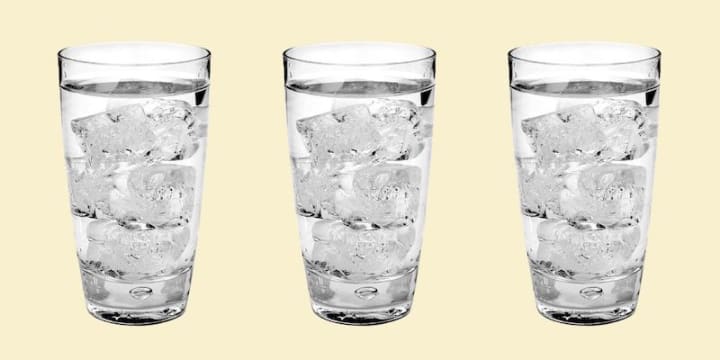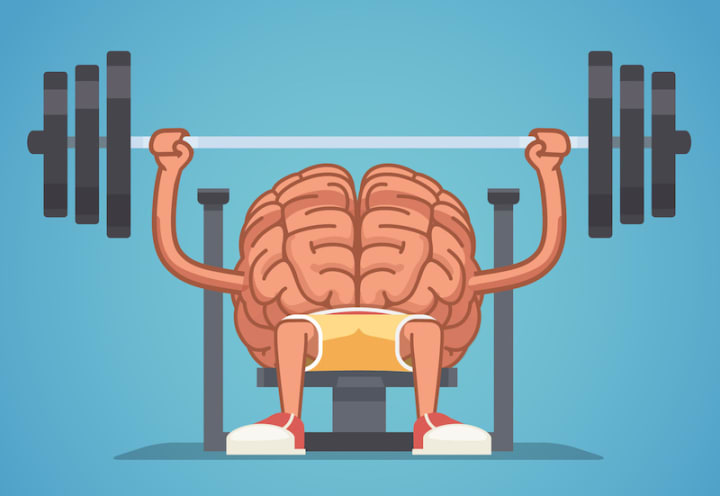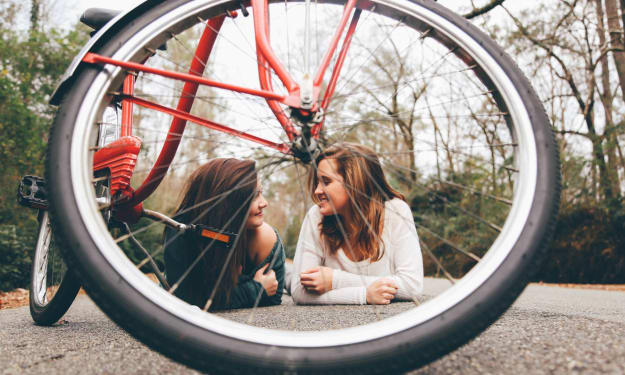Amazing Lifehacks That Are Backed by Science
Enter lab rats and physiological gurus for the testing and creation of lifehacks that are backed by science; it's about time we made health a lifehack-able resource for better, simpler, longer living.

Lifehacks are truly the diamonds of laziness, but they don't have to make people lazy; they just have to make life easier, which may or may not make a person lazier. It really comes down to the person more than it does the lifehack itself. While they might be more well-known for decorative ensembles or party-going procedurals, like designing more in-home space or using a mouthwash bottle for easier vodka consumption, they don't always have to be stringent upon physical attributions. In reality, lifehacks at their heart were meant to simplify the complexity of life itself, so why shouldn't some deal with increased mental health benefits, life satisfaction, and an overall more productive attention span?
As such, the following lifehacks that are backed by science literally utilize the science of research and observation so as create more versatile activities for better living. Anywhere from the improvement of sleep cycles to the engineering of more intellectual awarenesses are possible through these practices. One thing of note: I would limit their overuse. This is more of a personal opinion I base on the fact that lifehacks can make us lazy, but don't always—my point being that overdoing any one of the following techniques could lead to worse symptoms than you first began with, because relying on one sole method for boosting health is probably the worse way of going about it. Positive thinking, mental stimulus, and consistent physical training all go hand in hand in the creation of a more well-attuned lifestyle, but the lifehacks below largely simplify the process.
Smaller Plates, Lose Weight
Sounds more like a mental counter-persuasion more than a mental health lifehack, eating one's meals off smaller plates actually does work in helping an individual lose weight. It's probably the most simple of lifehacks to make you healthier (that's also proven to work).
This physical health booster is among lifehacks that are backed by science; called the Delboeuf Illusion. The illusory mental function actually makes the brain assume the portion on a smaller plate is larger than it really is. The research shows that filling a small plate to at least 70 percent capacity will lead to around 92 percent of that food being eaten. All I have to say to that is: science!
Slower Chewing
Similar to the "smaller-plate voodoo illusion" that confuses you into eating healthier options, chewing food slower than normal can also trick your mind into raising your happiness level. Coined "mindful eating," or the particular focus of one's experience when consuming foods, tracking your eating habits by way of textures, flavors, and induced feelings all have proven that savoring each bite will literally lead to your savoring life itself.
Dr. Diamond identifies the ways in which healthy eating and gratitude (both shared and self-actualized) go hand-in-hand. In explicating the importance of knowing just where your food came from and how it arrived on your plate, Dr. Diamond says:
"Consistent mindful eating practice is a way to cultivate gratitude, an important component of happiness. And, you'll also be more likely to choose healthier food and be less likely to overeat."
Timetabled Socializing
Sociability, especially with nearly hundreds of available online community-based social media platforms, has evolved into a dog-piled mess of various ideals, from globalism and communicative services, to business operations and political news op eds—75 percent of which are either half-truths or garbage.
Luckily, there are lifehacks that are backed by science to remedy healthier (and even wealthier) lifestyles: they're called social connectivities. These are some of the most important relationships for generating pure happiness within an individual, if even that person's been through hell and back. For those who don't believe me (which is hard to even imagine, but they're definitely out there), read up on one of Harvard University's more prominent psychology professors, Dan Gilbert, and his ideology on this very concept:
"We are happy when we have family, we are happy when we have friends, and almost all the other things we think make us happy are actually just ways of getting more family and friends."
Even more interestingly shocking (to say the least), a published study in the Journal of Socio-Economicsidentified one rather peculiar pattern in owning friendships; a shadow pricing method used by the study uncovered that any individual's various relationships are worth an estimated $131,232 a year! I'll tell you one thing, if having a bunch of friends didn't put a smile on your face to begin with, hearing that they all somehow bring you in loads more cash a year (plus, happiness, lest we forget) definitely will—and should.
Pressure-Pointing Headaches Away

One way to ensure a blistering headache gets remedied is by targeting certain points of pressure across various areas of the body. This mental health booster is among the more ancient of lifehacks that are backed by science, or more accurately, years of traditional Chinese medicine called acupressure. Heard of it? I'm sure you have, but never like this. One Taiwanese study even postulated that acupressure methods like these often are more effective than even chronic muscle relaxant medications.
Dr. Matthew Diamond, sports medicine and rehabilitation medicine physician, says that applying pressure to area of skin between your thumb and index finger will reduce or even eliminate the headache altogether. According to him (and, again, to the years of traditional Chinese therapy methods) pressure points activate what's called the parasympathetic nervous system, the polar opposite of the sympathetic nervous system that's responsible for our "fight or flight" mentality. This greatly relieves pain in the mind and relaxes your nervous system for limited sensual pain.
Caffeinated Napping
It may sound absurd at first, but it's truly remarkable when in connotation with the other lifehacks that are backed by science. Now, it's no news to anyone that naps are generally the best ways for improving health and cognition in daily activities, but what if instead we added a hot cup o' Joe before nosediving onto the pillow?
Coffee mimics the neurotransmitters in your brain called adenosine, which are the brain chemicals that get blocked when one drinks coffee. Caffeine molecules will suppress these chemicals' activities and, therefore, not make you drowsy for which the adenosine had intended. For that reason, when one drinks coffee right before taking a 20 minute nap, they'll wake up refreshed and supercharged in the long run.
Physical Exercise
Albeit a relatively obvious addition to the list, exercising twofold is enormously beneficial to your lifestyle's increased health no matter in what capacity it's used. It's also at the zenith of tips for a balanced and simple life, but none of you need me to tell you this. What you need are lifehacks that are backed by science...
Enter The Happiness Advantage, Shawn Achor's expressive literature that details the ways in which a variety of active exercises can lead to positive levels of emotions. It examines three different types of patient groups all suffering from their own forms of depression. One group was administered medication, another exercise, and the last was given a combination of the two. The ultimate findings this study unearthed? Exercise reduces depression. It's like you're literally beating your negative emotions to pulp, all the while heightening strength, physical wellness, and an overall positive self-environment.
Wake Up to Cold Water

Without actually waking yourself up by splashing cold water over your body (which may actually be beneficial in some way), instead simply drink a glass of cool, cold water following your rise from bed. You'll not only feel energized and much more aware, but research shows that it'll last throughout your day far longer than coffee's sake.
The stipulation comes from how a person's body is made up of 60 percent water. Upon waking, especially after an average 6-8 hours of slumber, replenishing your system and, hence, hydrating yourself in the morning will lead to major boosts in energy, which simultaneously raises preparedness, focus, attention and life satisfaction. Lifehacks that are backed by science? This is a lifehack backed by obviousness over all.
On a side note, I also suggest preforming deep breathing exercises either in the morning or early afternoon. Similar to (or exactly it) meditation, deep breathing in the morning releases inner stresses, maintains healthier digestional tracts, and keeps both mental thoughts and physical activities as clear as a cloudless, sunny day.
Body Clocking with Food
You may not know this, but just like how clocks are in almost every building everywhere, so to does every human body contain one. Unlike normal clocks, body clocks need to be reset pretty much every day by way of sleep, of course, but the issue is that not everyone can just knock out at will.
Fortunately, there's a terrific example for assisting this issue among lifehacks that are backed by science: eating. This "body clock" I refer to is the circadian rhythm, and it's regulated by not only day and night dictations, but also from one's food intake. Therefore, one of the best lifehacks to help you fall asleep faster is eating, because fasting at specific intervals can help your body regulate fatigue easier and more appropriately.
Sleep on It
You've all heard it before, from who obviously differs from person to person, but it's been overused so much by now it's practically a cliché: "Just sleep on it." Whatever the proverbial "it" is doesn't matter, because this well-known cognitive stimulus in fact does work, and here's why:
Not simply through the act of recharging and regaining alertness from slumber itself, sleeping when attempting to learn a new skill or achieve something of note has been proven to work wonders because of the consolidation of raw data in our brains that occurs through deep sleep. Reading up and studying on the particular information needed right before hitting the hay is among lifehacks that are backed by science.
Brain Training

One of the best ways in designing easy daily habits that will make you smarter is the consistent act of brain training. More so a function of educational awareness and a stimulus for productivity rather than a lifehack, brain training can still find itself among lifehacks that are backed by science, since brain training is nothing more than the conditioning of one's mental cognition and firmly building structures for a better attention span to improve focus, increased happiness level, and enables life satisfaction.
Brought to us by the University of Michigan, wherein a team of neuroscientists and psychologists underwent scientific studies on "dual n-back training," research shows that this form of brain workout actually improves fluid intelligence, thinking, and problem-solving. Dual n-back training deals with matching a visual and auditory cue, which forces participants into deciphering a variety of information at once. To do your own lifehacking, download Dual N-Back on iTunes and see how far your brain can take you.
Cussing the Pain Away
Utilized by many, yet never actually known to its full scientific potential, swearing when in pain is actually among the best lifehacks that are backed by science. Some may have even heard of this already; stub your toe? The first thing that leaves your mouth is easily something beyond needing parental blockage and a couple bleeps.
Studies have only recently begun to show that expletives, when bellowed upon the initial sensations of pain, actually do assist in the reduction of that pain's feeling. Witnessed in how test subjects fit their hands in ice water far longer than on average, due to the fact that they were chanting bad words amid the process, helps to prove this theory is, if only somewhat, factual.
About the Creator
Johnson Bernard
Father of four, married for twenty years, and yet I still have the energy to type this up at 1 am as little Timmy begins to wail from upstairs. I'm a fixer-upper and a family man.
Enjoyed the story? Support the Creator.
Subscribe for free to receive all their stories in your feed. You could also pledge your support or give them a one-off tip, letting them know you appreciate their work.






Comments
There are no comments for this story
Be the first to respond and start the conversation.